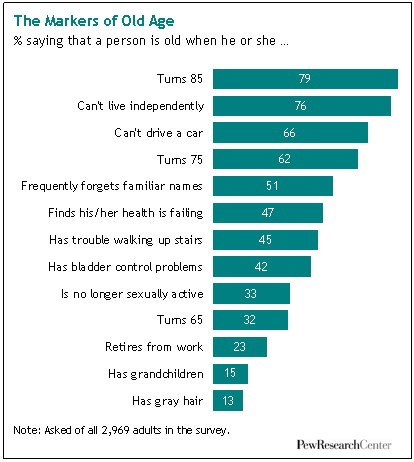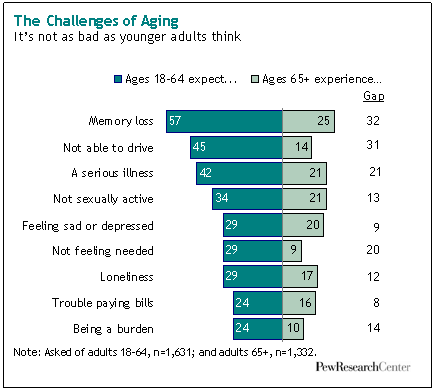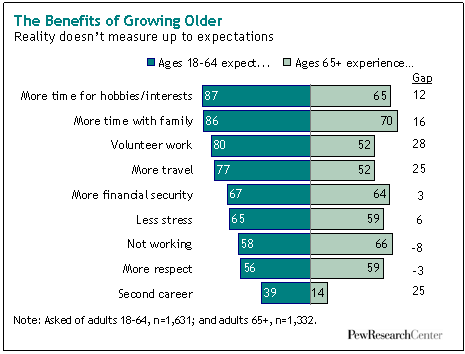The Generation Gap: 1969-2009
Sam Rainer

Yesterday the Pew Research Center released data from a recent study on aging in America. They compared their findings with results from a 1969 Gallup poll of similar questions. You can read the full report here. After interviewing over 2,900 people they found several differences in the younger and older generation. That’s not a surprise, but their focus on the downside, upside, and perception about growing old was fascinating.
On the downside of growing older: When it comes to potential problems related to old age, the share of younger and middle-aged adults who report expecting to encounter them is much higher than the share of older adults who report actually experiencing them.

On the upside of growing older: As seen in the chart, older adults may not experience “upsides” at quite the prevalence levels that most younger adults expect to enjoy them once they grow old. Of all the good things about getting old, the best by far, according to older adults, is being able to spend more time with family members.

So growing old is not as good or bad as expected. But spending time with family is most important.
On the perceptions of the generation gap: In a 1969 Gallup Poll, 74% of respondents said there was a generation gap, with the phrase defined in the survey question as “a major difference in the point of view of younger people and older people today.” When the same question was asked a decade later, in 1979, by CBS and The New York Times, just 60% perceived a generation gap.
But in perhaps the single most intriguing finding in this new Pew Research survey, the share that say there is a generation gap has spiked to 79% — despite the fact that there have been few overt generational conflicts in recent times of the sort that roiled the 1960s. It could be that the phrase now means something different, and less confrontational, than it did at the height of the counterculture’s defiant challenges to the establishment 40 years ago. Whatever the current understanding of the term “generation gap,” roughly equal shares of young, middle-aged and older respondents in the new survey agree that such a gap exists. The most common explanation offered by respondents of all ages has to do with differences in morality, values and work ethic. Relatively few cite differences in political outlook or in uses of technology.
When does old age begin? According to this survey, the average response of all the people in the survey was 68, but only 21% of people ages 65-74 say they feel old. So I guess you’re only as old as you feel 🙂
What I continue to take from these types of surveys is the importance of cross-generational ministry in the church. Obviously, this report did not address generation gaps in the church. But my research has shown how important it is for people of all ages in the church to be serving together. There may be a generation gap – we’ll never avoid it – but we can bridge the generational divide in church through serving together.







sucks